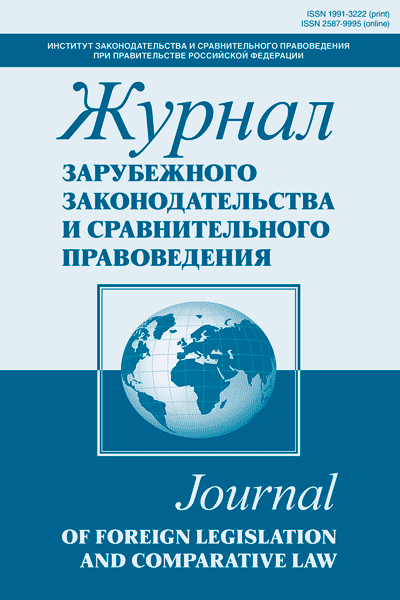The article examines the problem of recognition of new states in international law. The author considers the concept, sources, theories, criteria of the institution of recognition of new states. The author analyzes various theories of the Institute of recognition of states, taking into account the provisions of the international law doctrine and practice. The author notes that at the present stage of development of the institute of recognition we should be guided by the mixed theory of recognition as the most corresponding to international law, and by States’ practice. The author discloses criteria for the recognition of States enshrined in international legal acts. At the same time, the author singles out the criterion of the legality of new states’ emergence. The conclusion is that the creation of a new State as a subject of international law is legitimate, if its appearance corresponds to the fundamental principles of international law. The appearance of a new state must not violate the mandatory principles of international law jus cogens, otherwise, a territorial formation can not claim to be internationally recognized and must be considered from the point of view of international law as illegally created.
the international legal recognition of states, the international juridical personality, the declarative theory of recognition, the constitutive theory of recognition, the mixed theory and the recognition criteria.
1. Raic D. Statehood and the Law of Self-Determination (Developments in International Law. V. 43).
2. Ashavskiy B. M. Mezhdunarodnoe pravo. M., 2011.
3. Biryukov P. N. Mezhdunarodnoe pravo. M., 1998.
4. Brounli Ya. Priznanie gosudarstv i pravitel´stv. Mezhdunarodnoe pravo. M., 1977. Kn. 1.
5. Gasymov F. R. ogly. Priznanie gosudarstv i pravitel´stv. Sovremennaya mezhdunarodno-pravovaya teoriya i praktika: avtoref. dis.... kand. yurid. nauk. Kazan´, 2005.
6. Ibragimov A. M. Priznanie i nepriznanie gosudarstv: opyt kompleksnogo mezhdunarodno-pravovogo analiza ponyatiy. Moskovskiy zhurnal mezhdunarodnogo prava. 2013. № 3. URL: http://www.mjil.ru/archive/2013-3.pdf.
7. Kazarovets E. M. Voprosy priznaniya novykh gosudarstv i pravitel´stv v sovremennom mezhdunarodnom prave. M., 1958.
8. Karaev R. M. Tendentsii razvitiya instituta priznaniya gosudarstv v teorii i praktike mezhdunarodnogo prava. URL: http://static.bsu.az/w8/Xeberler%20Jurnali/Sosial%202009%204/54-66.pdf.
9. Kudryavtsev V. N. Kurs mezhdunarodnogo prava: v 7 t. M., 1989.
10. Lukashuk I. I. Mezhdunarodnoe pravo. M., 2005.
11. Mammadov U. Yu. Nekotorye voprosy teorii i praktiki priznaniya gosudarstv v sovremennom mezhdunarodnom prave. Rossiyskiy yuridicheskiy zhurnal. 2012. № 6.
12. Obzor kruglogo stola «Problema priznaniya gosudarstv». URL: http://www.eurasialaw.ru/index.php?catid=70:-10-17-2009&;id=425:-10-17-2009&Itemid=156&option=com_content&view=article.
13. Oppengeym L. M. Mezhdunarodnoe pravo. M., 1948. T. 1.
14. Savchuk K. A. Problema fragmentatsii mezhdunarodno-pravovogo priznaniya gosudarstv v kontekste fragmentatsii mezhdunarodnogo prava. Rossiyskiy yuridicheskiy zhurnal. 2013. № 5.
15. Timchenko L. D. Mezhdunarodnoe pravo. Khar´kov, 1999.
16. Tolstykh V. M. Kurs mezhdunarodnogo prava: uchebnik M., 2009.
17. Fel´dman D. I. Priznanie v mezhdunarodnom prave (priznanie novykh gosudarstv i pravitel´stv). M., 1975.
18. Fel´dman D. I. Sovremennye teorii mezhdunarodno-pravovogo priznaniya novykh gosudarstv. Kazan´, 1963.





